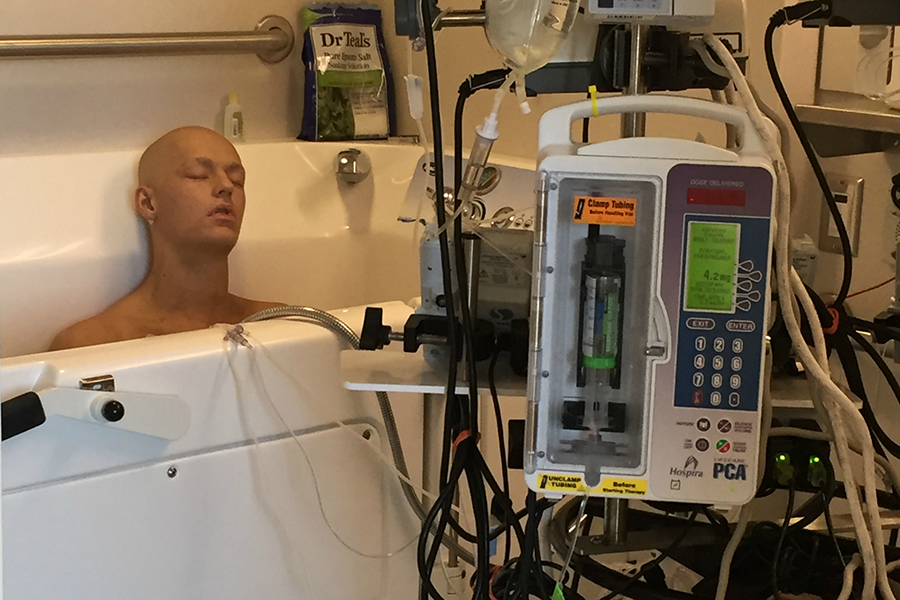I’ve stared at cancer every day for the last two years, not once, not twice, but three times. Cancer knows I’m not going to budge; I’m not going to let it win.
Cancer has become part of me because cancer became a part of my brother.
“I have a 30 percent chance that I’m not going to make it through this, Kirsten.”
These are the words from my youngest brother, Alex, after receiving his bone marrow transplant a few weeks prior, soaking in the tub to relieve his joint pain from chemotherapy.
My heart stopped. My body became numb. I tried to reply to him without letting him hear any trembling in my voice. “Seventy is looking a whole lot better than 30,” I said. His eyes were closed, and I knew he couldn’t see tears filling in my eyes, or my lips quivering. He was sick, incredibly sick, both he and I knew it. Waiting day after day, for his new cells to engraft, overcoming life-threatening septic shock, he now was also battling a severe case of graft-versus-host disease in his gut (his body starts attacking the new healthy cells.)
“I feel like my body is dying on me, this has got to be what death feels like,” he said.
My knees just fell to the ground, I sat on the hospital bathroom floor leaning against the wall and just let my tears go – I couldn’t hold back anymore. I had stayed too strong for too long. He had never seen me cry about him. It wasn’t because I was in denial about our situation, or afraid to let him see me – I just knew my role as his big sister was to protect him, be his advocate and stay positive.
“When is this going to end?” he said. I replied, “You’ve beat cancer once, you will do it again. You’re a fighter. You need to fight for you, for your life, fight for mom and fight for dad. We all need you here.”
His response to that was, “I am. Silently.”
I had no reply. I couldn’t carry on that heavy conversation, knowing that days before his odds had decreased to 50 percent because of the severity of his graft-versus-host disease. My family chose not to tell him that because we didn’t want him to feel defeated. He was too sick to be focusing on the negative. I sat in silence and stared at his beautiful bald head while he fell asleep in the tub, listening to the buzzing of his twelve IV pumps – the only source keeping him alive.
This was our reality, this is where cancer had led us. Here we were, having our first pity party because of the drastic change in our lives within those weeks; relying on hope, prayers and modern medicine to pull us through.
To be honest, it caught me off guard. Alex never talked like that. He never dipped into anything negative about his diagnosis or even went down the path of death. It was never an option for us. Anytime you asked Alex how he was feeling, he would say “good,” put on his smile, even on the worst days.
The reality of the situation is Alex has been fighting this battle since he was 16. Although he is my “baby brother,” he’s not so little anymore. He is a young adult, making adult decisions. He was making decisions that no 17-year-old should ever have to make. But he understands what cancer is, he knows the reality of this ugly beast, and he has seen and conquered it already.
Alex had a living will made before we walked through the double doors of the bone marrow transplant floor, understanding the severe complications that can arise, knowing when enough was enough for him. For him to have control of his health and wanting to be a part of making those decisions was possibly the hardest reality my family had to face. He was aware – aware of it all. Although he never spoke of it, internally he had been digesting it.
After our conversation that day, I felt like I was losing him.
I lost the control I once had to protect him as if I got slapped in the face with my fears. I had no control of what was happening, no control of when Alex was going to say enough is enough, and absolutely no control of cancer. The only control I had was to be the best sister, to make sure he never felt alone, to give him my time, my patience, my positive energy and to be his friend.
Because in the end, all you have is hope. Hope that this transplant works, hope that his new cells engraft, hope that he can make it through this critical time. If you don’t have hope, what do you have?
“As long as we refuse to let our spirit be broken, have the courage to fight on, never give up hope, and always keep the faith, then tomorrow is possible” – P. Morning Bear DeMarks
Kirsten Mowrey is the middle child of her family, 28 years old, and a dental hygienist, yoga lover and a foodie for the latest restaurants in the Twin Cities in Minnesota.




